
Transcriber’s Note:
The cover image was created by the transcriber and is placed in the public domain.


SALLY.

| LONDON: | NEW YORK: |
| Ernest Nister. | E. P. Dutton & Co. |

If you take a short-horned cow, a limping calf, a few sheep, a swarm of fowls, a pig with a litter of eight, and an everyday lazy kind of horse, you have John Dobbin’s well-stocked farm.
One morning John woke up at five, bustled round the hen coop, gave an extra feed to the pigs, milked the cow, fed the limping calf, and then went into the stables.
“Now, Sally, old girl,” he said, making some fuss as he fed his old mare, “just keep your eye on things 6a bit. I’m goin’ round to Farmer Peckett. He’s in bed, bad with rheumatism, an’ I shan’t be back afore dinner.” So saying he took the halter from Sally’s neck, and let her roam about at will.
Sally left to herself felt glumpy.
“Now where’s the master gone off this morning,” thought she. “Farmer Peckett. I know no Farmer Peckett. It’s very queer his leaving us all alone. Something might go wrong while he’s away, and he can see to things a lot better than me. Just look! There’s that calf a limping among the lettuces. And that knock-kneed hen with her chirrupy brood scratching the carrots up as if she was seeking to-morrow. I do believe those bees mean to swarm, and no master here. I’ve watched him swarm ’em many a time, but I couldn’t manage it.”

Hen with her Chirrupy Brood.
8“If you’re not off about your business, you old gimmer,” as a long-nosed sheep looked through the hedge—“I’ll, I’ll— Now what do you want?” called out Sally, turning from the patient ewe to a fat, wheezy donkey coming up the garden path. “What brings you here this morning, Neddy?”
“He-haw!” said Neddy, rolling his tongue round and round, and giving a three-cornered look out of his left eye. “Thought I’d just see how you were getting on, Sal! But you do look prime.”
“Just be off about your business.”
“Beg your pardon, my lady. But if you have no objections I’ll just march myself off into the stable. I know Farmer Dobbin supplies you with good fodder.” And away went Neddy “he-hawing” for all he was worth, and 9frightening the chicks out of their poor little senses.
While Sally was looking after him, and marvelling at his cool impertinence, up came a tinker. “Pans to mend, kettles to mend, scraps of old iron,” he cried.
“What, Sally!” he called out cheerfully to her.
“He-haw!” bellowed Neddy.
“Where’s John Dobbin? Are ye carryin’ on the farm by yourself, Sally? Well, you’re a fine steed to place in front of any man’s castle! I’ll speak a word for ye when I see the general again. He’s sure to be wanting a new charger to carry him off to the wars soon. But I see you’re figgity, Sally, so I’ll bid you good-day. Pans to mend! Kettles to mend! Scraps of old iron!”
10“Mercy on us!” wailed the frightened creature, the perspiration dropping from her nose end. “How thankful I am to think he’s gone! If he’d walked into the kitchen, and master out, he’d have smoked up all his new baccy. When will it be twelve o’clock? Oh, but I don’t like looking after things. I will be glad when master comes home.” Because she felt relieved of anxiety a warm feeling spread all over Sally, and her poor old heart felt happy. Even Neddy’s ugly “he-hawing” failed to rouse her ire. So she fell to trotting about the garden in a silly kind of way. While Sally was frisking about in a happy-go-lucky fashion, up came a sailor.
“Morning,” he said, “fine time o’ year this.”
Sally looked sad.

“No one at home, eh? Where’s John Dobbin? Hasn’t left any message, eh! Stand out of the way and I’ll go into the house, and sit down till John comes. Bravo! my beauty,” stroking the limping calf, “you’re a fine mixed lot of customers I can see. Master John will be at the market I’ll be bound. It’s twenty year since John and me 12met. Won’t we have a fine time of it now. I hear he’s never married, n’more have I. Wait till he comes in, we’ll be spinning yarns till bed-time.”
All this time Sally was pawing at the cobbles with her hoof. “Well, you’re a cool hand to be sure,” thought she. “And he’s helping himself to my master’s baccy. Well, if that doesn’t beat all. I’ve got him in the kitchen at any rate, and if he isn’t quite quiet, he looks honest. I’d best be off and see how Neddy’s getting on, for he’s a first-class scamp if you like.” And away she trotted, seeing on the road that the bees were hard at work, for you will understand how this lazy old horse was most particular that everyone else but herself should be working. She did not like to see anything idle. If you notice, animals that have lived 13a long time with people learn to know their ways. And it may sound funny to you children, but I have often seen animals try and imitate their owners. So if any of you have a pet you must be careful and behave kindly before it, for then, at least, you will be setting a good example. And I would advise you to have nothing to do with a boy whose dog fears him, or with a girl who is not kind to her dollies.
“Now, where is Neddy?” said the weary mare, “for not a speck of him can I find. There’s every bit of fodder munched up—rakes and spades kicked about—yes, he’s been here sure enough. And there’s the brand new bucket stamped on. Whatever will Master say? This is keeping an eye on things till master comes back, isn’t it! Oh! dear me. I’ve got a run-a-gate donkey 14somewhere and a Jack Tar in the kitchen smoking my master’s baccy.”
“Bow-wow-wow!”
“What’s the matter now?” As Sally turned round she saw a sheep dog. “Oh? Ben, it’s you,” she cried. “I’m nearly worried out of my wits. For goodness’ sake do stop here, Ben, and keep guard till master comes back. There’s the bow-legged toppin’d hen wants keeping in her place, and that limping calf ought to be tethered. And Neddy ought to be sent home instead of stamping the fodder about and kicking the new bucket, and—there’s that sailor chap in the kitchen smoking my master’s baccy! Mercy on us! what’s that?” as a band struck up a gay tune. “It’s a travelling circus—no, it isn’t. My word, the whole village is up and our sailor gentleman is dancing a hornpipe! 15Thank goodness—there’s master coming! Whoever would have thought of things happening like this!”
“What cheer, John!” cried the sailor, extending his hand and running forward to meet his old friend. “How are ye, my hearty? What, don’t you know me, John? My old chum! Why, I’m Sam—surely!”
“It can’t be, but it is!” and the farmer’s voice became husky. “I’ve thought ye dead this many a year. So you’ve actually returned, Sammy!”
“To settle in the old country, and to pitch my tent alongside o’ yours, John.”
“Look here, you sailor man,” cried Sally, “master belongs to me. We run this farm between us, we do, and we want no hornpipy sailor to join us.”
“And where does this band come 16from?” asked the farmer. The musicians, let me say, were trumpeting and drumming for all they were worth.
“Well, I brought it with me from Jarmouth. Look here, my hearties,” he called out, “change the tune to ‘Auld lang Syne’ and we will all join in the chorus.”
Which everybody did. Even Neddy sat on his haunches and “he-hawed” his loudest, of course, lolling his tongue round as usual, and throwing three-cornered glances in all directions. The limping calf was touched and was suddenly seized with a racing fit; and the chickens, no doubt thinking that the end of the world had come, turned somersaults and fought battles in all directions.
Poor Sally groaned aloud. “Ah! this is the end of everything,” she 17said. “I’ve cared for, and worked for master for many a year, and now what between the sailor, the band, the chickens, the bees and Neddy—well!”

“I think the whole stock has taken leave of their senses,” said Farmer John. “Why, Sally, lass,” he said, looking upon his woe-begone horse, 18and patting her on the shoulder, “do you think, old girl, that I have forgotten thee? No, no! Now, my good people,” flinging a coin to the musicians, “I thank you for your music, and good-day to ye. Don’t you see that you are frightening my animals. Neighbours,” he cried, addressing the crowd, “good-day to ye also, and Sam, my man—quick march into the house. Adieu!” he cried to the departing crowd. “This sort of thing don’t quite suit country folk—now do it, Sally?”
And as he led the horse by the halter he whispered in her ear: “Now you needn’t go and be jealous, old girl. Sam shan’t put your nose out. You’ve been a good old servant to me, and you’re missis here, so keep your temper.”
19Sally stamped her feet.
“He says he’s come to retire with you, master,” she began, only John had walked away. “And oh!” winnied Sally, only John did not hear her, “after I’ve been missis ever so long, it’s hard to be supplanted by a hornpipy sailor!”
“Have bought a first-class mount,” read out the vicar, from a telegram which he had just received. “There,” he said to his wife, “it’s done now—so Towser will have to go.”
“What, part with Towser? Poor old Towser,” spoke up Mrs. Dene.
“He’s so slow, and I have been indulgent too long already. Now, don’t make a fuss, my dear. I daresay you have grown fond of him, and so you will be of the new horse when it comes.”
That settled it.
Next morning soon after breakfast, the groom led a fine spirited mount 21up to the hall door. Up jumped the vicar from his seat.
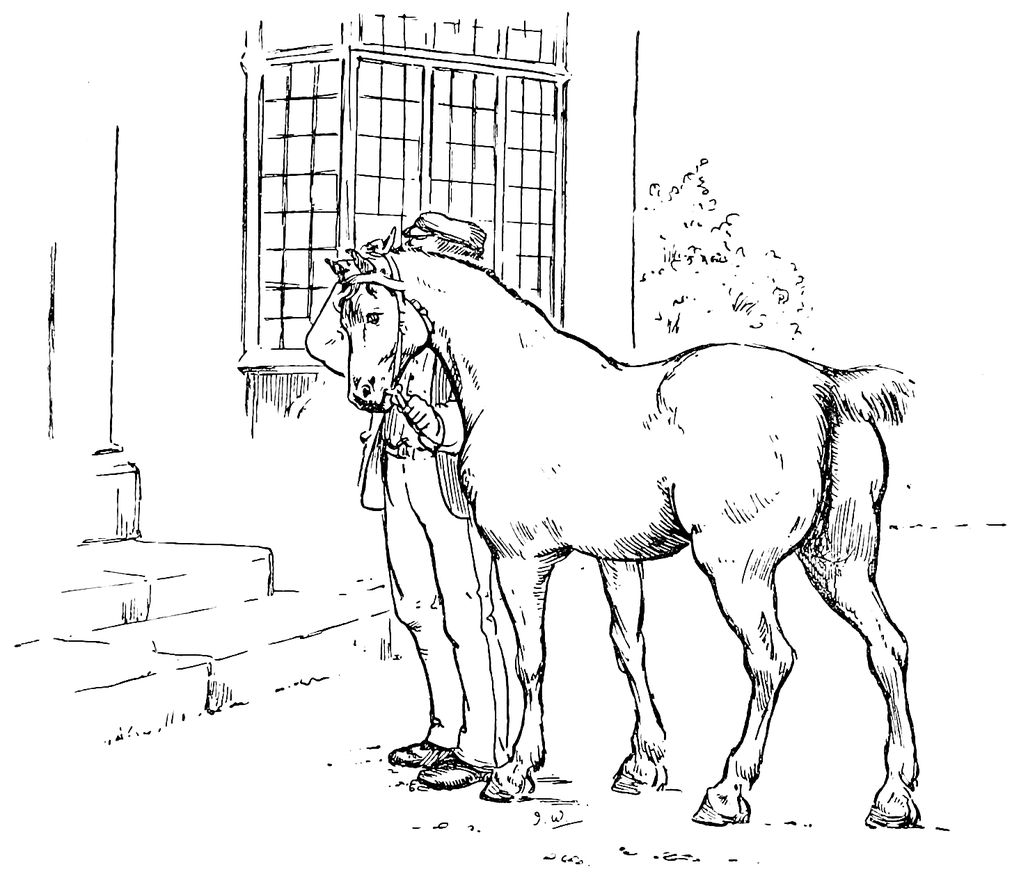
“Ah! Lucy Lu! Now are you not pleased with my new purchase?” he cried.
“You are sure that horse is quiet, John?”
“Read the warranty.”
22“He doesn’t look steady like dear old Towser.”
“Please don’t bracket them together. They are two entirely different animals. This new horse is well bred, and but six years old; while Towser has not many good points and is aged.”
“You won’t send Towser away—now will you, John? for I’m sure this new horse will not suit. He’s got such a wicked eye.”
“My dear, what silly things you say. I can see you don’t like my new purchase, and I do,” said the vicar, emphatically.
“Morning, Hopkins.”
“Morning, sir.”
“Well, this appears to be a grand creature,” stroking the mane.
“Yes, sir,” said the groom.
23“I somehow fancied Grahame would choose well. He has a splendid head. Fine bone. Stands well. Splendid flank—got many good points, I notice—he’s not quite as sedate looking as our old pony.”
“Indeed he’s not, sir.”
“Well, we shall see. I’ll take him for a ride.”
And as his master rode away, “He’s a real bad’un that little horse is,” said Hopkins. “A reg’lar bad’un. Bought at a grand Repository, and quiet and sound, warranty says—a real varmint,” says I.
Now as Lele was stepping along, would it not be as well to tell you something of him, children? To begin with, he had been sold several times, changed masters more than once for something worse than disobedience. He 24was up to all kinds of tricks, could buck, kick, jib, in fact he could perform all manner of naughty tricks—yes, do all except do as he was bid.
So he looked this way and that, snorted, gave a bit of a jerk, just to rouse his new master, and than sighed. “Well, it’s come to a nice thing now,” he grunted, “me—a well-set-up sprightly hunter, knocked down at a sale for thirty pounds! Sold to an old parson. Humph! I’ve seen lots of parsons in the hunting field, but never thought I’d like to live with one. Now I know I shan’t. Wish I hadn’t thrown Lord Jim. Bless me! Changed my walk in life entirely, and however I shall take to being a goody-goody horse I don’t know. Suppose I shall have to eat second-rate oats till I grow old and wheezy.”
A gentleman who was riding along 25the road stopped to speak to the vicar.
“Hallo!” said Lele to the stranger’s mare. “How do! Fine morning.”
“Very,” said the sedate little grey mare.
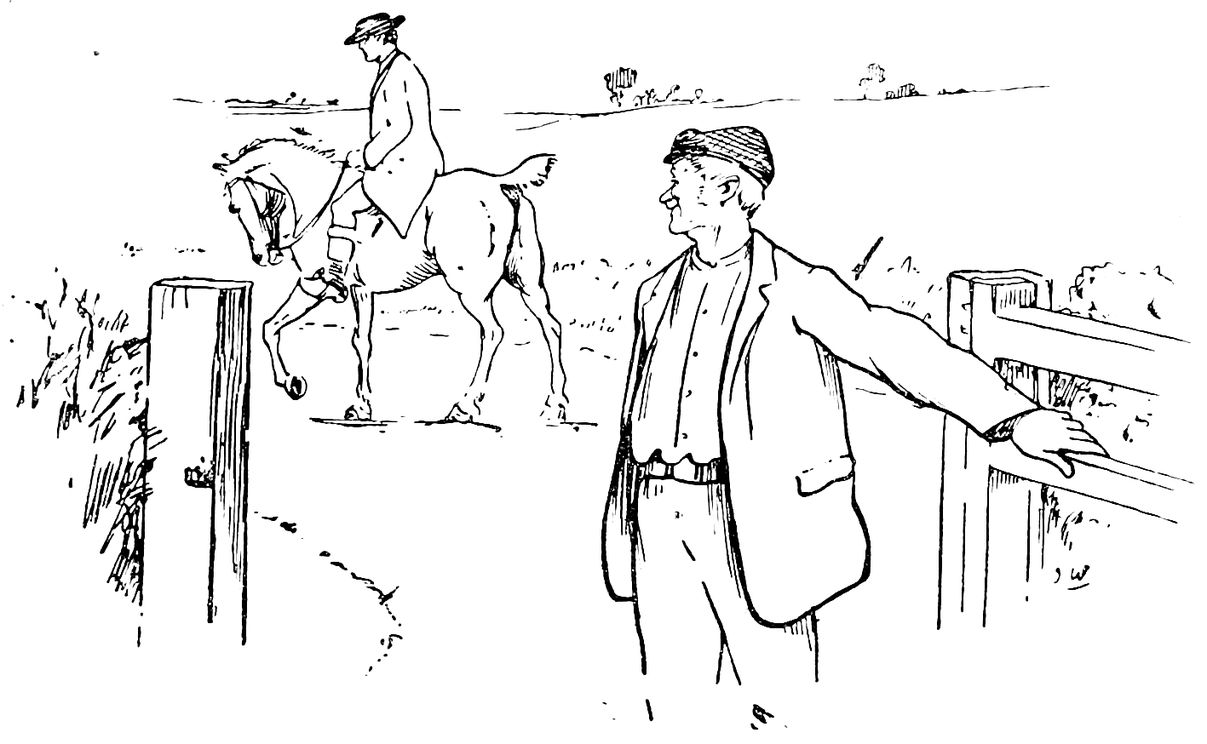
“Not much doing here. Slow sort of place I should say, eh?”
“I don’t know what you mean? Have you just come to this neighbourhood?”
“Came last night. Slow train. Block in the line. A miserable journey.”
26“Do you think you will like the neighbourhood?”
“No.”
“Oh! you rude creature, I shan’t talk to you any more! Where do you come from, and whatever is the vicar doing with you?”
Lele took no notice. Presently he said:
“Does nobody hunt here?”
“Hunt? My master doesn’t, but people he knows do. I’m sure your master doesn’t.”
Lele groaned. “Well, however I’m going to suit goodness knows. I shall die of yawning and rust out before a month is over.”
“As I was saying,” said the vicar to his friend, “I think he is a perfect little horse. He is quiet, as you see, and I’m not likely to kill him with 27work. I just go my usual round, but I do like a well-bred horse. He’ll have a very easy time of it with me.” Lele groaned louder than ever.
“We have not stiff hills in this neighbourhood.”
Lele grew restive.
“And life is much the same all the year round.”
“Shall I bolt?” fumed Lele.
“I ride for an hour in the mor—”
“Look here, I can’t stand this. In all the homes I’ve had there’s been something to do. There’s been steeplechasing in Spring—hunting—”
“Why, the hounds are out,” called Mr. Dobson. He was riding a little way in front and could see over the hedge. “See! there’s the whip making for Cranstone Hill! Is he used to following the hounds?”
28“I don’t know—he does appear restive. Whoa-a then!”
“Do you hunt, Mr. Grey?”
“Oh, yes, but I haven’t indulged in such things for years.”
“Then you’d better get off—I wouldn’t trust that horse.” But the vicar had no time to get off, and another thing he did not mean to. He meant to stop on.
“It’s my opinion my master is not so simple as he looks,” thought Lele. “He’s been used to spurs he has. What a dig he did give me then. I shall have to try to unsettle him—for he is rather a heavy load to carry, and I mean to follow the hounds—”
“Tally ho!” rang out in the clear morning air as Lele bucked.
The vicar stuck on.
He shied.
29His master didn’t care.
He jibbed.
But he might have exploded if he liked, nothing short of an earthquake would have disturbed the vicar.
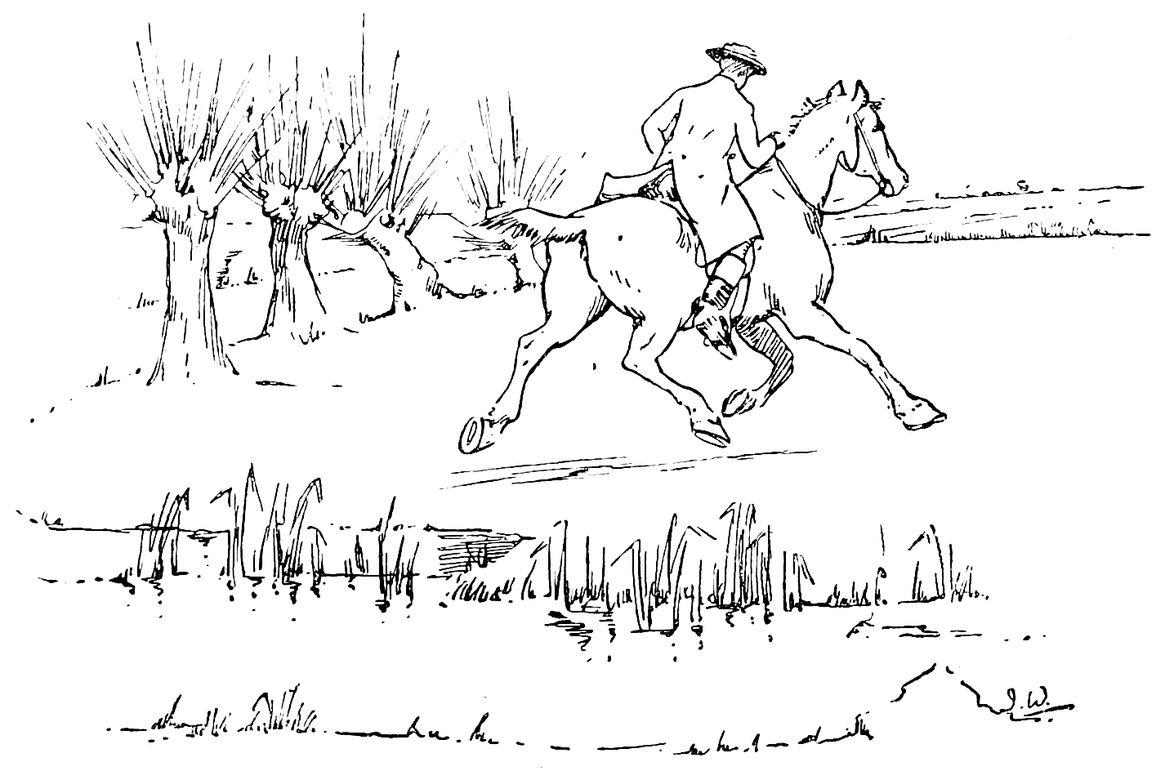
“I say, hold hard there,” yelled Mr. Dobson, “he’ll kill you.”
“No, he won’t.”
“You’d better get off.”
“Not if I know it.”
“You won’t, then, eh!” struck in 30Lele—“then here goes—” And, like a flash, over the hedge he went—in short, I may tell you he had galloped a field over, cleared a gate, forded a stream, broken through a copse, and then, Tally ho! he was with the hounds, close alongside the whip, and in a few minutes stood with his master, who was perspiring and mopping his face with his handkerchief, abashed at the attention his presence called forth, and stammering his thanks to the master of the hounds who handed him the brush.
“Allow me to congratulate you, good sir,” he said.
“Now, just look here,” interrupted Lele—only nobody noticed him—“that brush belongs to me. I followed the hounds, and as I couldn’t throw the vicar off, of course I had to bring him—much against his will—a fact, I 31assure you. Just stick that brush behind my ear, please. Why, Kiddy, is that you?”
“Lily!”
“Goodness me! Wonders will never cease, I own a vicar now—you know I was bundled off to a Repository after I had thrown Lord Jim.”
“He’s here.”
“Never!”
“But he is, sir! Here he comes riding that limping crocodile of a nag—don’t think he is benefited by the change—do you, Lele?” But before Lele could answer Lord Jim had discovered his late horse. He made up to the vicar as they were going home.
“Excuse me, sir,” he began, and then, “allow me to congratulate you on your horse.”
“What, another!” said the vicar.
32“I have just sold him.”
“That accounts for my possession—fact is I have just bought him.”
And then it all came out—Lord Jim repented parting with Lele, and although the good vicar said nothing, he thought, “Well, he’s certainly a bargain, but my parish will miss me if, every time I want a little trot out, my horse takes it into his head to follow the hounds.”
And how it came about I cannot tell you, children, but before the vicar got home he decided to let Lord Jim have his favourite back again.
“I repented it directly after. But you do look so stupid being thrown in the hunting field—it was the first time, you know.”
The vicar nodded—and Mrs. Grey chuckled when he came home, safe but very much shaken.
33“He’s far too much for you, John.”
“Yes, my dear, you are right.”
“Old Towser?”
“Shall remain.”
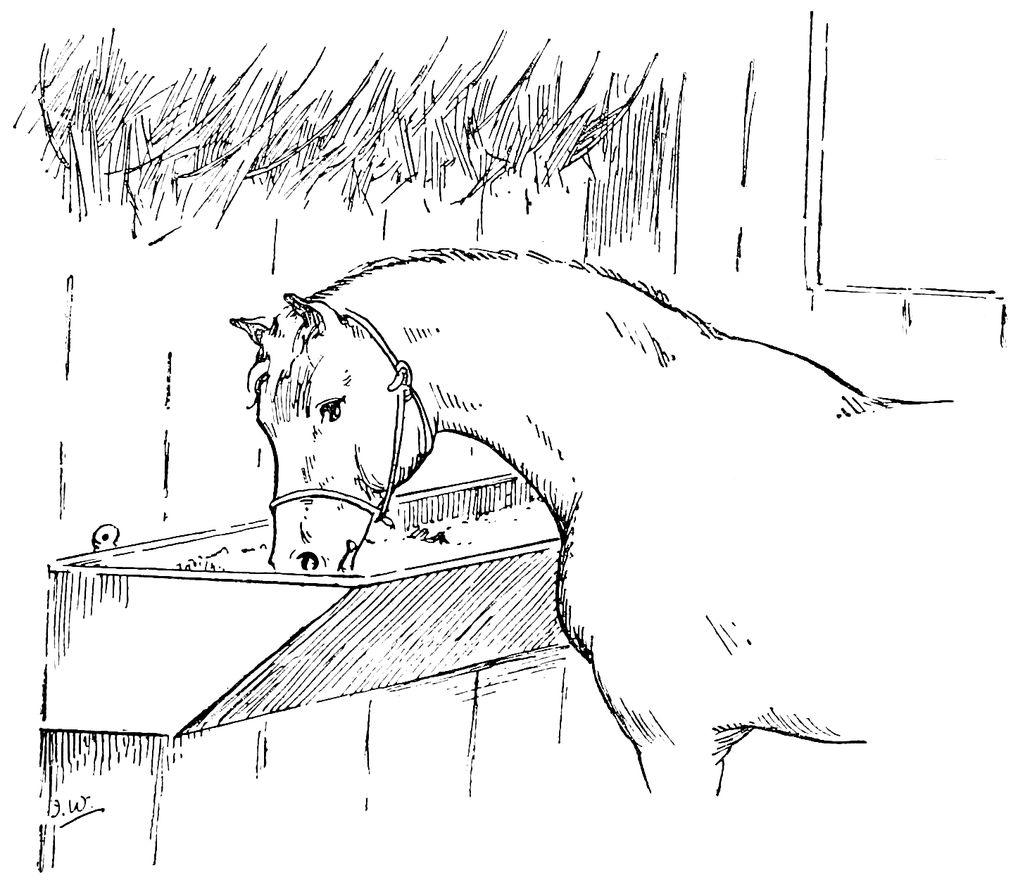
“And Lele?”
“Again belongs to Lord Jim.”
“It was a clear walk over that,” mused Lele as he crunched the well-grown 34oats in Lord Jim’s stables that night. “I never met my match till his reverence mounted me—I might have behaved ugly, but I’m pleased to think I didn’t throw the old gentleman. There’s ever so many runs in prospect, you say?”
“Five,” said Biddy.
“And I’m entered for next Spring steeplechases, so Tally ho! But I know—I’ll never throw Lord Jim again!”
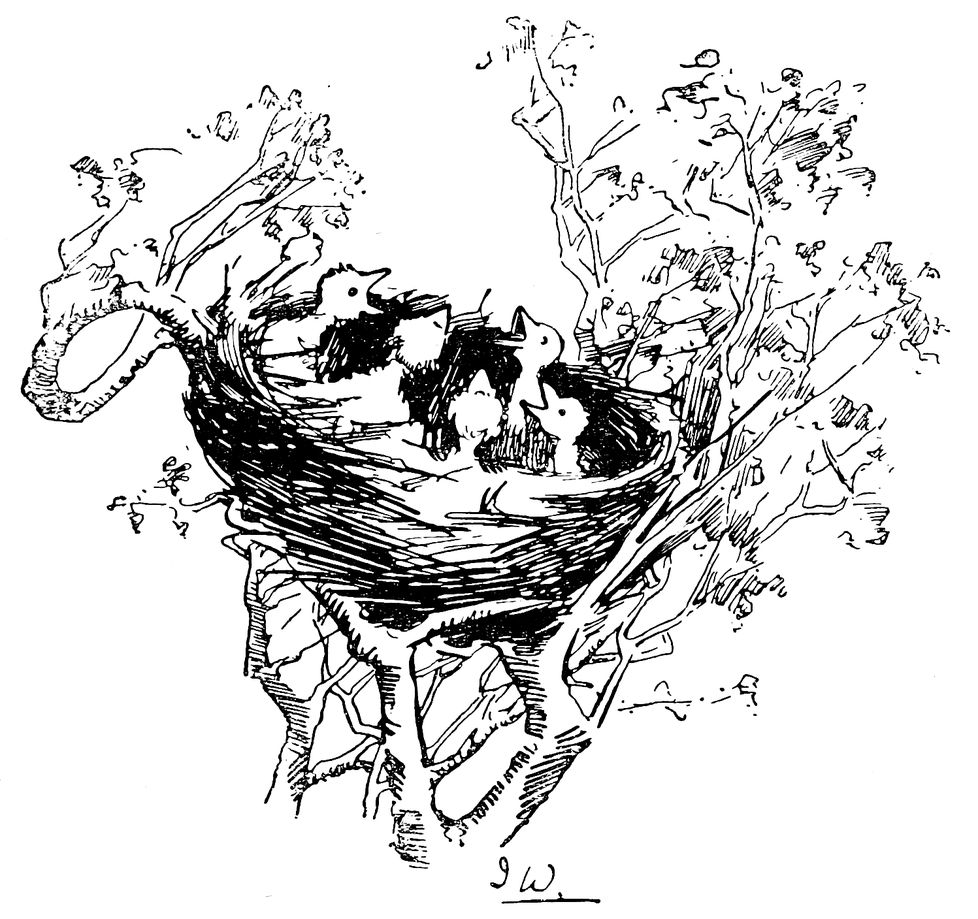
Simon lay on the grass, thinking. He flicked a fly that was tickling. Although he was a most worthy horse, he was often troubled with very grand notions about himself and very poor thoughts concerning his neighbours.
36Day had not yet begun at Tower Tighe Farm. The stars had faded away, and the great warm sun was waking up the nestlings, waking them up to cry for food, and disturb folk generally, for everything was very quiet and still at Tower Tighe.
The owner, John Fairfax, was a spare man, very thin, with a grey straggly beard, and bright blue eyes. He possessed fierce-looking brows, and a very long nose. His wife was a fat little lady, who bustled about a great deal, and went round the farm saying kind things to everybody, and to Tony the fox-terrier in particular, for Tony was a thorough little scamp. He told old Simon one day, that missis was a deary, and behaved fine when she wasn’t walking. Then she was just like a lop-sided hour glass, so fat all round—save at the waist, which was thin, and she wobbled like a tee-totum.
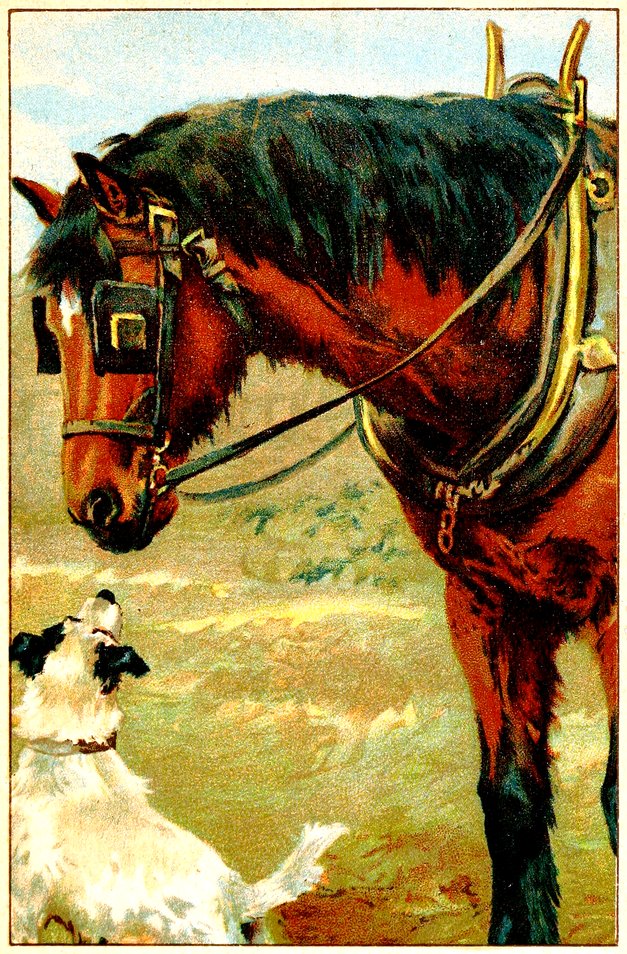
SIMON.
37“If everything and everybody would only wake up,” moaned Simon, chafing at the stillness about him.
“Wake up. Arn’t I here,” called Spangles, the Rooster, as he proclaimed to the world “Cock-a-doodle-doo!”
“I’m glad to hear you say so,” snapped Simon.
“Top of the morning to you, sir,” said Spangles. “Don’t get crabby with your neighbours. Hi! there,” he called out, as he saw Tony racing after a rabbit.
“Never mind that nimble scratcher,” neighed Simon. “Come here and I will tell you something. I am going to the Mill—are you ready to join me?”
As Simon mentioned “Mill,” Tony stopped.
38“Rats live there,” he said to himself, “rats.”
“We can talk,” said Simon, seriously.
“Indeed,” said the sagacious dog.
And when they were on the high road bound for the Mill, Simon began:
“Tony, I’ve been considering.”
“Indeed!”
“You’re a decent little fellow.”
Tony blinked.
“I’ve been bothering about this a long time.”
“Never thought you bothered about anything. You’re such a quiet old chap, Si. But hurry up! Do! There’s a shrew waltzing along the road, and I’m getting impatient. Do be quick; I can’t go marching by your side in this procession-like fashion for ever and a day, now can I?”
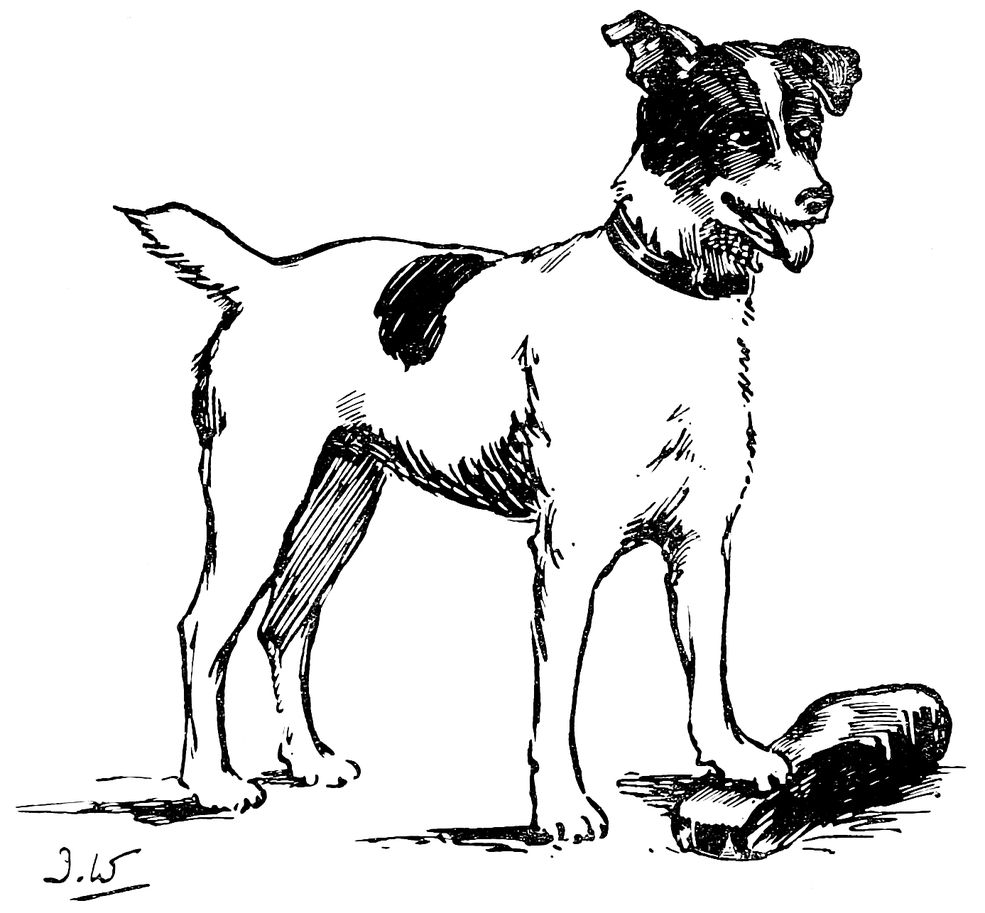
“Well,” began Simon, which told of an ache at his heart, “Master Harry’s coming home. He’s been away for years and years. He was one of the liveliest lads you’d meet in a day’s march. But he had one big fault. When he wasn’t romping he was learning lessons. And how those lessons did spoil him, they took all the fun out of him. Master 40says they put sense into his head, but what does anyone want with sense, answer me that? and you know it isn’t proper for a lively lad to be thoughtful. Well, as I was saying, he was a fine sturdy chap was Master Harry—that’s years before you were born, nipper.”
“Humph!” said Tony.
“Well, now he is coming home, at least he has written a letter to say so. He says that he has grown rich, and has been to foreign places, and is bringing a horse and a dog—you hear that Tony, a horse and a dog.”
Simon said this so seriously that Tony looked up.
“I’m the only horse here, and you are the only dog here, and Tower Tighe is but a small farm.”
“A regular scrap of a place.”
41“Well, it appears to me that our whole life will be changed.”
“It will be jollier for both of us, if you mean that,” said Tony. “There will be a friend for you and a companion for me, for if you just ask yourself, Simon, we ain’t—er—quite companions, now are we?”
“You’re such a featherhead, how could you expect to be a what-d’ye-say to me. You never could think of things in the right way.”
“Bah! you’re always repining, and I think life’s far too scrappy to waste it in grumbling. When you take growing-up time off—teething, distemper, and lots of things come to you whether you want ’em or you don’t; then there’s meal times, sleeping, and sometimes you have to take physic—O! my, life’s very short, when you take off all these 42things. Just see what a glorious morning it is! Whoop, there! I see a rat?”
And off trotted Tony in full pursuit of a rodent which had made for his hole, leaving the little dog to fume and fret and bark himself hoarse all to no purpose.
“That’s Tony to a nicety. There never was such a scamp in this world. But he’s a good-tempered little creature for all that. He’s so nice and frisky. I try, but I suppose I’m growing old. Now, if I was to try to be unselfish and funny, I wonder how I’d feel—Bah! but I will!”
Now as the cart was laden Farmer John sprang up, and the horse that started pulling him was Simon certainly, but what a changed creature was he. He fairly charged the hills instead of crawling up them, and then he took the high road as if he had springs in his hoofs, and his dinner was awaiting him at home.
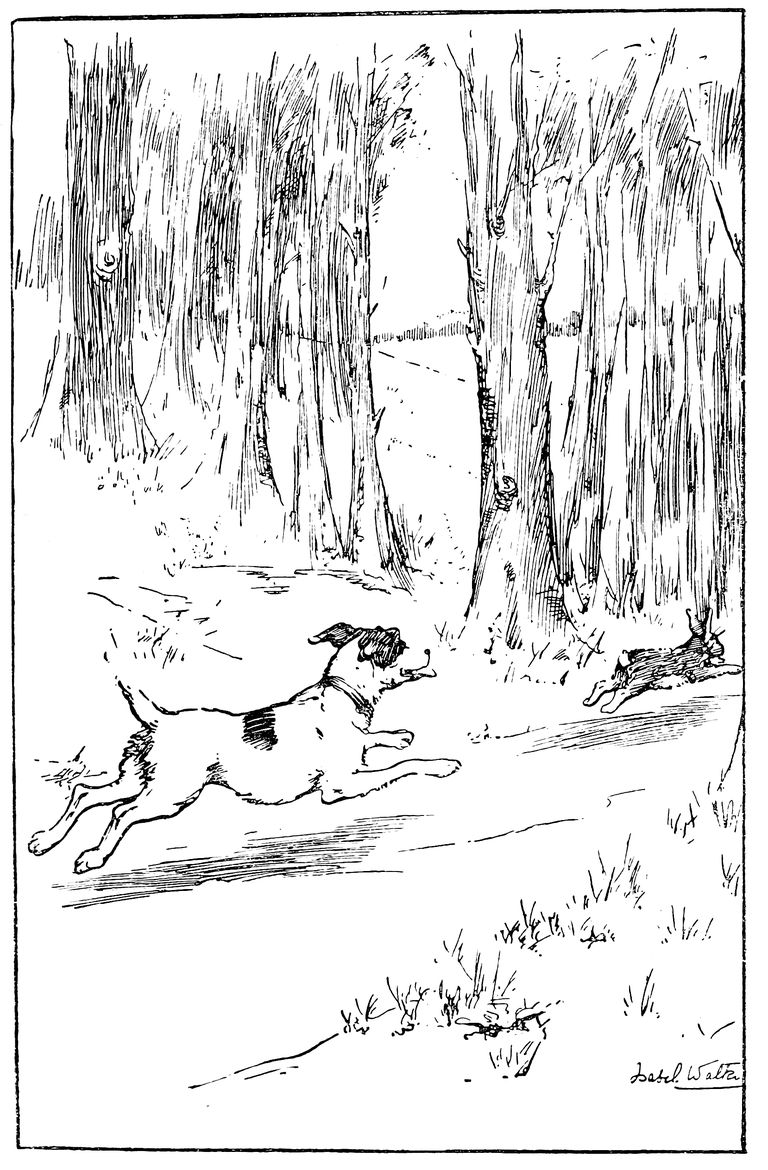
Tony racing after a Rabbit.
44“Why, Giles,” said the farmer on nearing home, “what’s all this fuss about? Why is the garden gate open, and why is all this fuss going on here?”
“Why, young Mr. Harry’s come home! Oh! master, master, an’ he’s growed a man, and he’s that big an’ strong an’ grand, he’d make two of me, master!”
“What!” said the farmer, springing from his seat. “Well, I’m blest—Hal? Why, old Simon, you must have smelt him—for I’ve never seen you skip up the road like that. Oh! Hal! Hal! my lad—why, you are a man indeed! My bonny lad—” as a stalwart fellow came forward to greet him.
“Father!” cried his son, and the two men clasped hands.
45Presently the old man spoke.
“Why, it’s thee, it’s thee, Harry!” and tears crept into the farmer’s voice.
You see it was ten years since Harry Fairfax had left home, a stripling, and now he had returned a sunburnt hearty man with a strong mellow voice, and eyes that were bright and merry and kind.
“Hasn’t he grown big, father?” said Mrs. Fairfax, mopping her eyes with a big roller towel she was busy folding when her son arrived. Then she flicked a stray bit of down which had blown upon his coat sleeve, flicked it away, and stroked the arm with a proud feeling of possession. “Do come into the house, Harry dear, and get a rest while I see to a bit of dinner. Father, I do believe this is the happiest day of my life.”
“Just wait till I bait Blackie, mother,” said her son, “I’ll be with you in a 46minute, but I want to attend to my beauty first. Ah! she’s a grand little lady, mother!”
“Just the same as you always were, Hal, somebody first and yourself afterwards. What a famous little mount she is though! Wherever did you pick her up?”
“In Texas.”
“Well, she is a dear little mare.”
“She is a thorough little Arab. I broke her in myself, and it’s one of my best investments, father.”
Here Blackie thought fit to express her thanks to her master for his kind remarks about her, and Farmer Fairfax stepped aside to allow her to show off her capers.
“There’s a second stall in the stable, Harry,” said his father. “Bring her along; my boy; Simon will be very pleased to have a bright little friend like Blackie.”
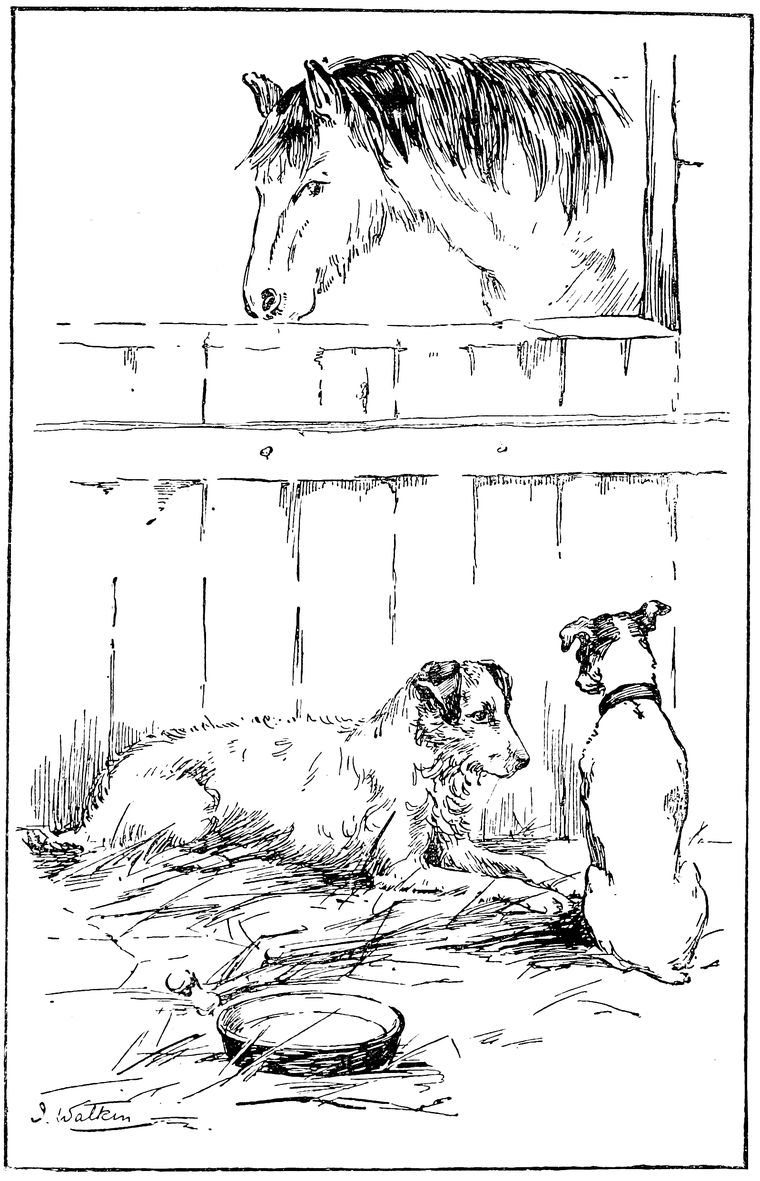
“I hope you feel at home now, Pat,” said the little Terrier.
48As indeed he was.
At first he was shy, fearfully shy, for he was not used to being stared at, and Blackie had such beautiful eyes which opened in wonder at the ungainly specimen before her.
“Good-day, sir,” she began, “I suppose I am to share this place with you!”
“Well, ye—s,” stammered Simon.
“Pleasant country this.”
“Very.”
“Been here a long time?”
“Always.”
“What a rusty old creature he is,” Blackie was thinking. “I believe he’s blushing.”
“Where did she come from?” thought Simon. Presently he stammered:
49“Do you like o—a—t—s?”
But before the answer was given Tony and Pat came tumbling in, breathless with running.
“I hope you feel at home now, Pat?” said the little terrier.
“Stunnin’.”
“And you like your quarters? I say, Pat, you’re the best fellow I ever saw in my life. Such a racer—such a catcher—” and for answer, Pat, who was tired out, had laid down to rest, snored “stunnin’.”
Snowie and Bob were quiet.
It was the end of the season at Burney, and already many of the ponies had left the sands to earn a winter living with the farmers round about. “Or do odd jobs,” Jenkins said, anything, in fact, till summer came round again, and they might go back to Burney and help to earn money by riding children up and down the sands at so much an hour or less.
“I wonder if I shall go to my coughy old gentleman this winter,” began Snowie. “I’ve been with him two winters already, and although he is awfully wheezy, and limpy, he’s easier to manage than wriggly children. Still I am sorry the summer is over. What say you, Bob?”
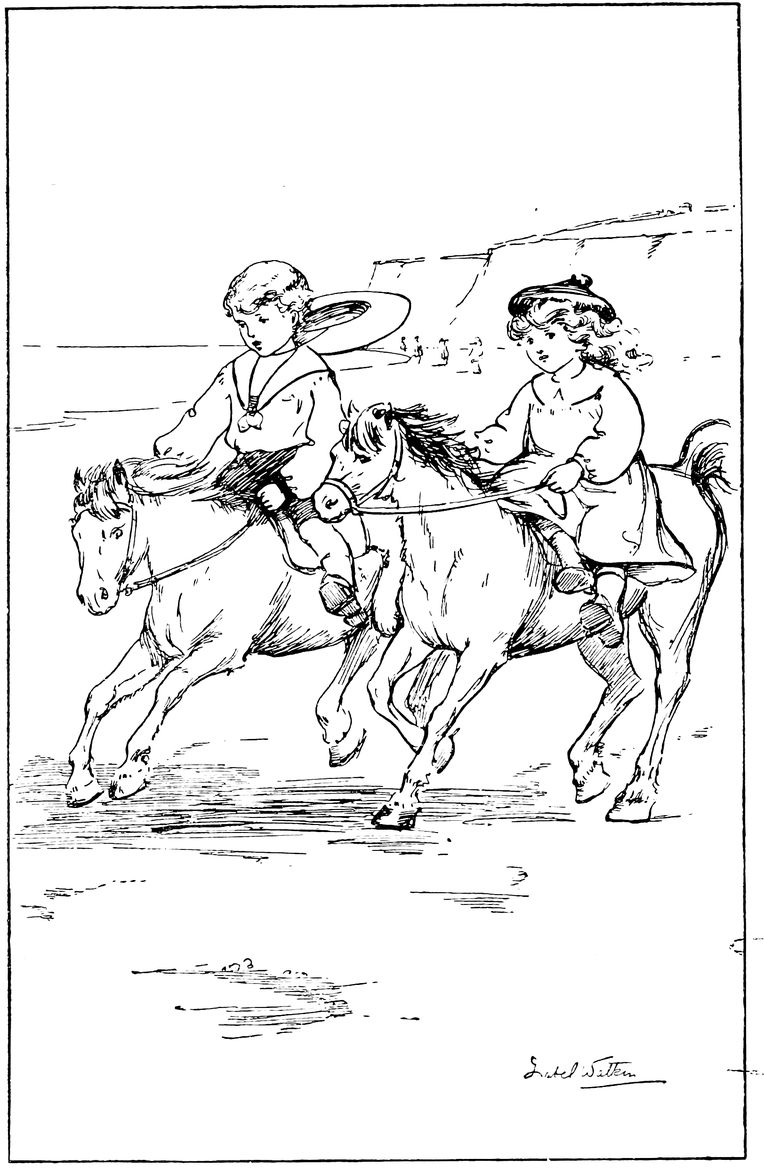
Riding Children up and down on the Sands.
52“Well, yes,” answered the brown pony.
“Sometimes I wonder where they put seaside children in winter,” continued Snowie. “Do they keep them in bed till the warm weather comes back again—or how?”
“Bed indeed! A cast iron bed wouldn’t hold the lads I have to carry—wobbly imps.”
“Well, we shall have to say good-bye, Bob. By the way, where do you put up in the winter?”
“Oh! I suppose I shall have to earn my living with Carrots. You see, I carry a boy, an only son, who lives near the moors, to school every morning. Then I bring him back at nights. He lives on the moors and sometimes a stiff 53time we have of it, what between blizzards and frosts, and snowdrifts.”
“Then you get some fun?”
“Yes, now and again we do. Carrots is brimful of mischief when lessons are over. I help him a bit now and then myself.”
“Our poor old master doesn’t look merry,” remarked Snowie, after a while. “He’s not been well this summer. His limbs are getting stiff; I’m afraid it’s been but a poor season for him.”
“Here they are, sir,” said Jenkins, walking towards the ponies. “As fine a pair as you would wish to see. They’re good-tempered little creatures, and thorough game. Rising seven, clean limbs, wind and eyesight, and right sorry I’m to part with ’em. They’re the best couple I ever had. That’s a fact. And if my health hadn’t broke 54down, and I’m giving up the business, nothing in the world would have made me sell ’em.”
“They’re certainly a fine couple,” said the gentleman, patting first one of them and then the other. He was evidently impressed, for presently he said, “If your price is all right, I am sure they’ll suit my boy and girl.” And do you know it only took a few minutes to settle the bargain?
You could see that old Jenkins was pleased, the way he clinked the gold before dropping it into his bag. “I feel sure you’ll be good to ’em, sir,” he said, as the gentleman was walking away. “It’s been a quick, satisfactory bargain, but I knows you’ll not regret it.” And before Snowie had got over the fright—for she had been listening with all the ears she had got—and Bob 55had realised what had taken place, old Jenkins had tossed off his coat, and was grooming them down in a spluttering, whistly wheezing way, and muttering away to himself something in this manner:
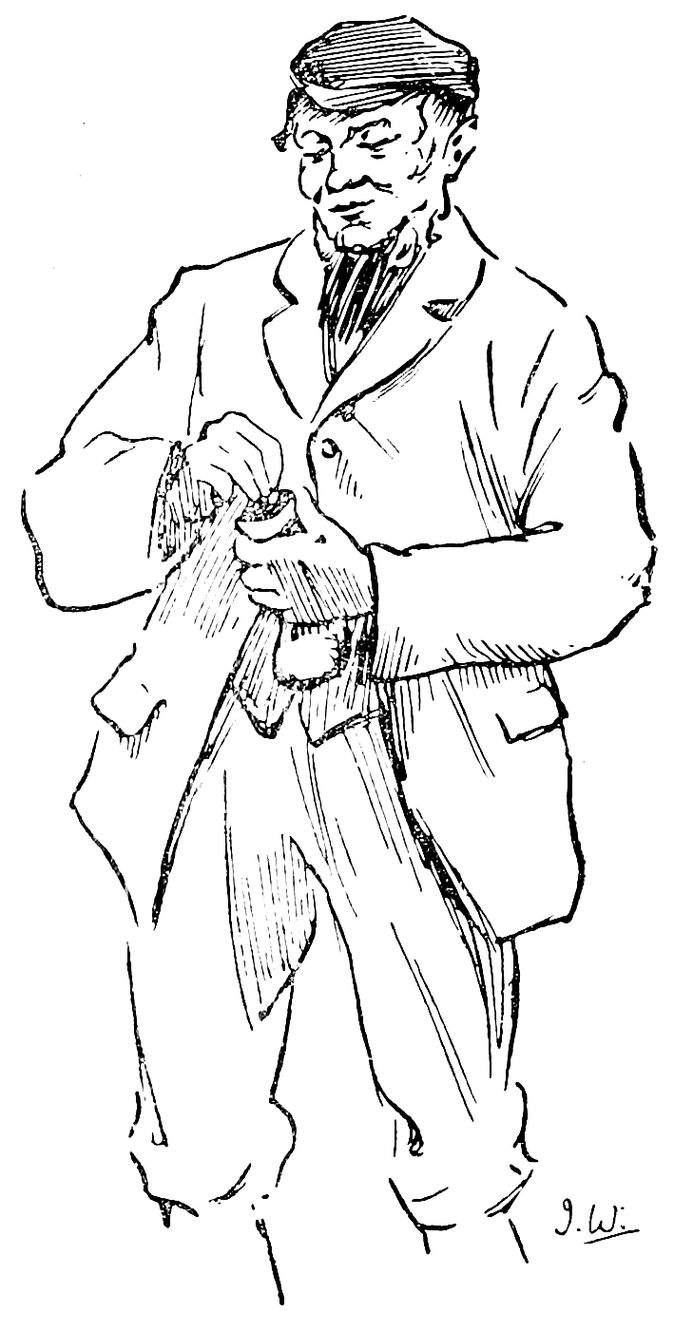
“Shoo! Snowie, my lass, come, yer going to leave yer old master and live with quality now. I know ye’ll behave yerself. It’s Bob what’s botherin’ me.” Here he began towselling the brown pony. “Mind when yer gets to yer new sitewation ye behave yerself, yer little varmint. No monkey tricks there, my man. No sly ways. 56You’ve both worked well for me, and I’ve done the best I can for yer both. I’ve sold yer to Squire Morton, and given yer first-class characters. So don’t go and disgrace yer old master—good-bye!”
And that was the way old Jenkins dismissed them.
They were taken to the station, bundled into a horse van, and presently arrived at Humshaugh, a quiet little countrified station, where a red-faced porter helped them out of the van, then gave them in charge of a groom who had come to meet them. “Why, Bob,” he cried on sighting the little brown pony, “whoever would have thought of seeing you again.”
“It’s David, ’pon my word it is,” cried Bob, stamping his feet and swishing his tail round and round like a windmill.
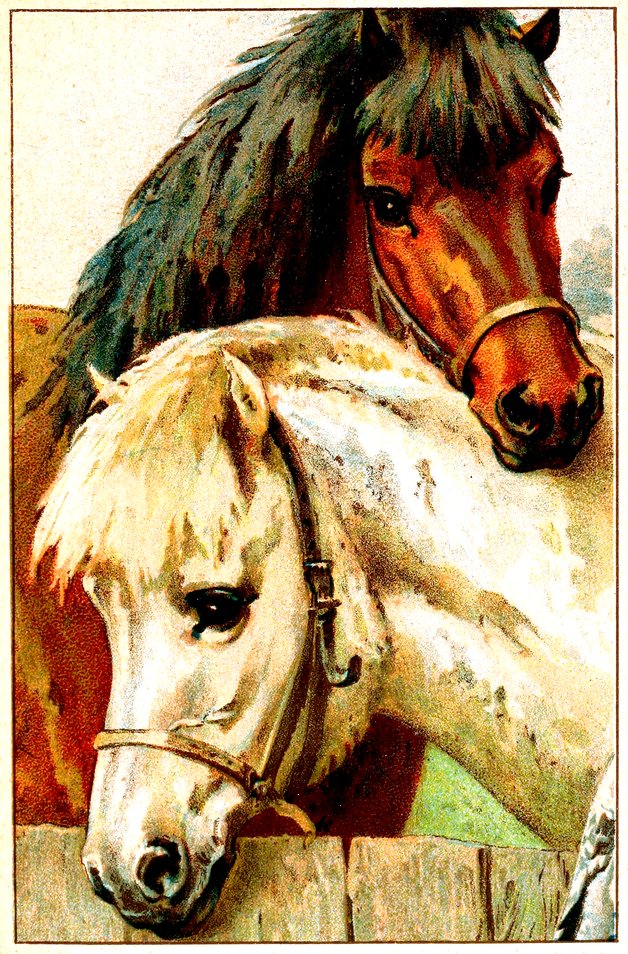
SNOWIE AND BOB.
59“You seem to know the pony,” said the porter.
“Yes, we have met before. It’s funny that the Squire should pick up Bob of all ponies in the world. So this little white creature is Snowie I suppose?” Snowie blinked hard. She was too shy to answer “Yes.” It was such a big social leap for her to take jumping direct from Burney Sands to Humshaugh Park that it took all her breath away.
“Bob,” she ventured, as they were trotting along the road, “do you think we shall like the change?”
“Is my mane straight?”
“I wonder what our old master is going to retire on. I hope he has plenty to keep him.”
“You will see I shall get new shoes to-morrow morning.”
60“Bob, are you listening to what I am saying!”
“I have oats for dinner, corn for breakfast, beans for supper, and—”
“Oh! he’s quite stupid,” sighed Snowie, “pride has completely turned his head.” Then she heaved a very big sigh. Bob took no notice of that. Suddenly he cried, “You must forget you ever ply’d for hire on Burney Sands, Snowie. Never, never remind me of it. You’re to mix with quality now, my dear.”
“By the way, that groom knew you, Bob.”
“Rather, I shouldn’t have known him though. He was in the stable where I was born. You understand? I always told you that I belonged to quality folks, Snowie.”
Snowie heaved another big sigh. “His 61head is completely turned,” she said. “Bob can’t stand prosperity. I shall have to keep my eye on him, I know I shall.”
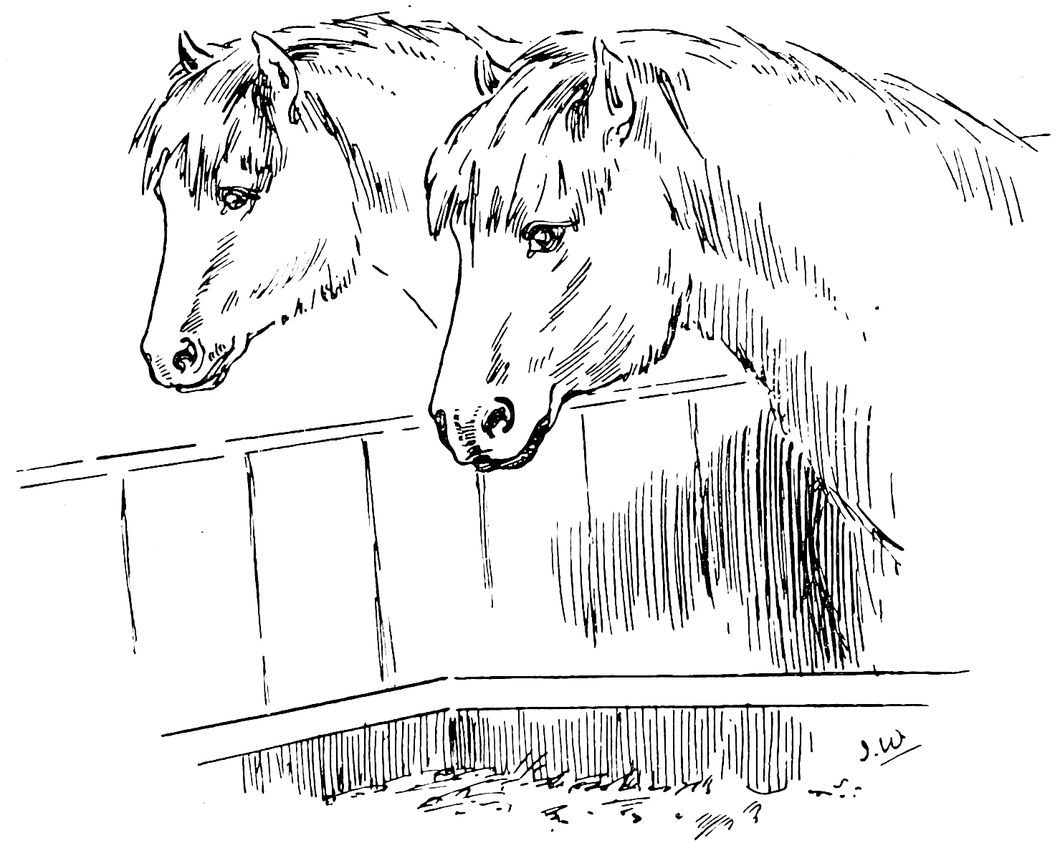
They had reached the Hall at last, and were taken round to the stable.
Bob took it all in at a glance. “Snowie,” he said, in an awed voice, “Snowie, we’re going to retire here.” 62Presently the sound of children’s voices burst upon them.
“Oh! David, you have brought the ponies. Father, they have come. We have been looking for you for an hour at least. What beauties! Which is for me, father?” cried Lawrence.
“And me, father,” cried Betty.
“The brown pony is for you, my child, and Lawrence is to have the white one. So you like them, my dears?”
“Like them? Oh, we love them, father! Wherever did you find such treasures? Thanks, thanks, a thousand times thanks, you dear kind father.” And the children threw their arms around his neck and kissed him again most heartily.
“There now, that is all right,” said Squire Morton, putting his collar straight. “Now mount. Never mind a saddle. 63David shall come and show your mother how you can ride your new possessions.”
And leaping upon their backs Lawrence and Betty trotted away, using the primitive reins that hung loosely round their ponies’ necks, and behaving like experienced equestrians.
“See, mother, what a lovely little creature mine is,” cried Betty.
“And mine,” cried Lawrence. “She is as white as milk and her name is Snowie.”
“How pleased the children are, John,” said their mother, “you could not have found a more suitable birthday gift.”
Whereat the Squire laughed.
“Just have a ride about the park, children, and then let David lead them away. It is tea-time now, and to-morrow morning you must both be 64up early and have a canter before breakfast.”
Afterwards when they were together in the stable and were made comfortable for the night, “Snowie,” said Bob, “before I go to sleep I should like t’fess. I told you a big fib as we were coming along from the station.”
“Oh,” said the sedate little mare, looking much shocked.
“Yes, I did. It was such a sudden change. And things have fashioned themselves so funnily I couldn’t stand it.”
“I understand,” said Snowie.
“You remember, David?”
“The groom here, yes.”
“I said he was groom in the stables where I was born.”
“I know you did.”
“Well, I said a very big fib.”
“Oh, Bob!”
65“David knew me when I trundled a rag and bone cart along the streets of London in company with my first owner, Mistress Sally Brimstone.”
“Yes, Bob. Rag and bone cart. Sally Brimstone? I can’t understand it!” cried Snowie, aghast.
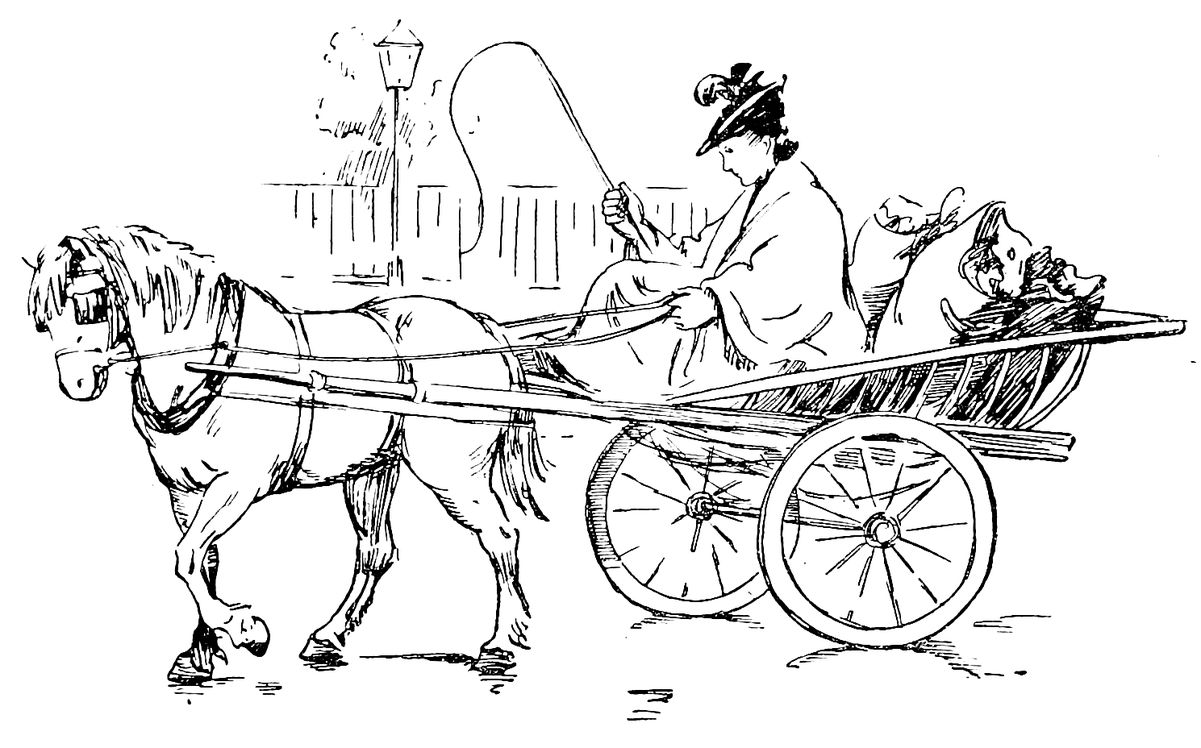
“No, but I can. Old Sally sold me to old Jenkins for thirty shillings. That’s where I came from, Snowie. Fact!”
66“But you always told me you were gently reared.”
“I’m afraid I always told you fibs. Now I’m going to turn over a new leaf in this new situation. From henceforth I shall speak the truth.”
“Bob.”
“Yes.”
“If I were you I would just hold my tongue and from henceforth say nothing at all!”
“Oh!”
And so let us leave them, children.